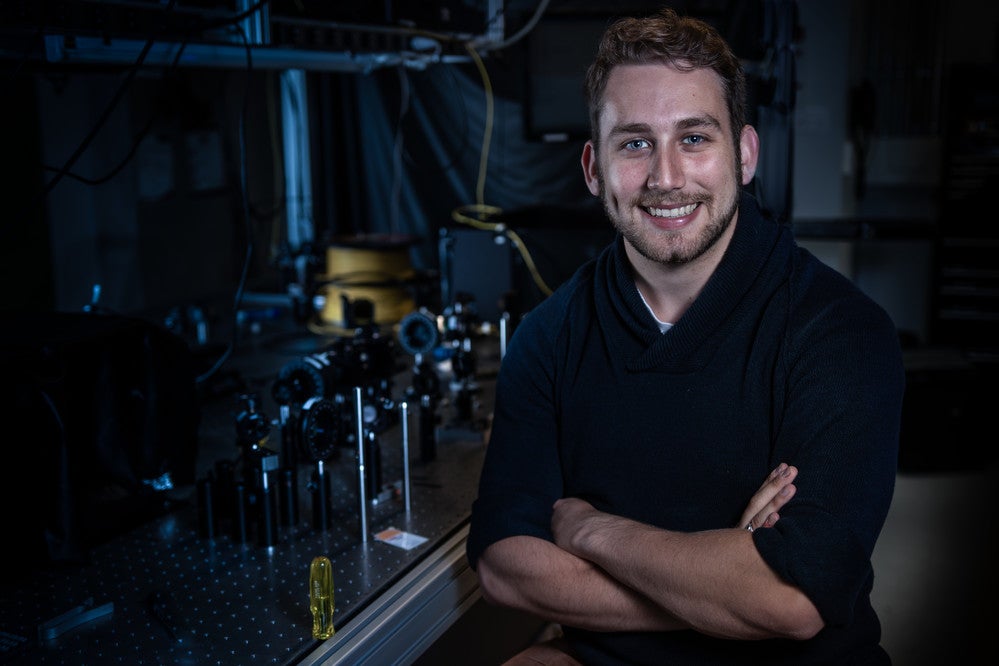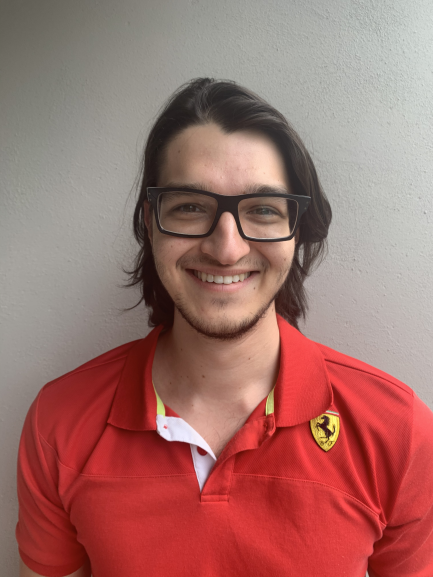The David Johnston Award for Scientific Outreach recognizes students dedicated to promoting public awareness of quantum research and science in the community. IQC is proud to announce this year's recipients, PhD students Andrew Cameron and Connor Kapahi.

Cameron, a student in the Department of Physics and Astronomy, studies ultrafast quantum optics and looks for ways to measure properties of photons on very short timescales in the Quantum Optics and Quantum Information Lab. And it’s those tiny particles of light that he uses as a starting point to introduce the fundamentals of quantum mechanics during his outreach.
“I like to start with light and show how, with enough imagination, you can build all the way up to quantum computing,” said Cameron, who has participated in several IQC outreach programs.
Cameron has visited high school classrooms to teach young students about quantum information science and technology, participated in tours for visitors to IQC, and given lectures and performed labs with high school students in the Quantum Cryptography School for Young Students. He is also a member of the student-led outreach group Unentangled, serving as financial officer and visiting high school classrooms to facilitate workshops before the pandemic.
He sees outreach as an important duty linked to the revolutionary potential of his field of study. “If you’re researching something that has the potential to change technology and the planet, that’s exciting for everybody, but it is especially exciting for people who don’t know what you’re doing and haven’t chosen their career path yet,” said Cameron.
“So, I think we have an obligation to tell the world what we’re doing. If we’re going to spend the time and money to develop these applications, we should spend the time and money making sure there are people coming up after us.”

Kapahi, also a student in the physics and astronomy department, knows the importance of outreach programs first-hand: “I wouldn’t be here without USEQIP [the Undergraduate School on Experimental Quantum Information Processing],” he said.
After completing USEQIP in 2017, Kapahi came to IQC as a master’s student and now studies structured waves under IQC and Physics and Astronomy faculty member Dmitri Pushin. “Basically, we want to make the wavefunction of the neutron corkscrew around,” said Kapahi. “We’ve been looking for applications for using these structured beams.” One interesting possibility is a device to diagnose macular degeneration with less cost and more certainty.
Outside of the lab, Kapahi has designed modifications for a board game being developed by the University of Waterloo’s Transformative Quantum Technologies that will introduce young students to the physics of light, crucial for understanding much of the development of quantum mechanics.
“We had some students come in and try the game out in 2019, and it was great to see,” said Kapahi. “It makes you excited for physics again. The reason you start doing physics because you’re excited about it as a kid.”
Kapahi has also participated in high school class visits, including virtual visits throughout the pandemic, and he helped design an experiment for USEQIP students to perform as part of their learning.
While he finds outreach its own reward, he sees the importance of the David Johnston Award for recognizing an important aspect of being a well-rounded researcher.
“It’s great that IQC is incentivizing grad students to pursue something that is worth it in its own right, but is difficult to make that initial time commitment,” said Kapahi.
“I think outreach is something that more grad students need to be a part of because trying to communicate ideas to people who don’t have the background you have is an incredibly valuable skill, and it’s something you can only really get through the crucible of the classroom.”
Des chercheurs de l’IQC honorés pour leur excellence en vulgarisation scientifique
Le prix David-Johnston de vulgarisation scientifique récompense des étudiants qui s’efforcent de sensibiliser le public à la recherche en physique quantique et à la science dans la communauté. L’IQC est fier d’annoncer que les doctorants Andrew Cameron et Connor Kapahi sont les récipiendaires du prix cette année.

Andrew Cameron, étudiant au Département de physique et d’astronomie, s’intéresse à l’optique quantique ultrarapide. Au laboratoire du groupe d’optique quantique et d’information quantique, il cherche des manières de mesurer des propriétés de photons sur des durées très courtes. Dans ses séances de vulgarisation scientifique, ce sont ces minuscules particules de lumière qu’il utilise comme point de départ pour présenter les fondements de la mécanique quantique.
« J’aime partir de la lumière et montrer comment, avec assez d’imagination, on peut aller jusqu’au calcul quantique » [traduction], a déclaré M. Cameron, qui participe à plusieurs programmes de vulgarisation de l’IQC.
Andrew Cameron est allé dans plusieurs classes pour instruire les jeunes sur la science et la technologie de l’information quantique. Il a animé des visites guidées de l’IQC, fait des exposés et des démonstrations de laboratoire pour des élèves du secondaire à l’École de cryptographie quantique pour jeunes étudiants. Il est aussi membre du groupe de vulgarisation animé par des étudiants Unentangled (Démêler), où il est responsable des finances et dont il animait des ateliers dans des écoles secondaires avant la pandémie.
Il considère la vulgarisation comme un devoir important lié au potentiel révolutionnaire de son domaine d’étude. « Si vous travaillez sur quelque chose qui a le potentiel de changer la technologie et la planète, dit-il, c’est passionnant pour tout le monde, mais particulièrement pour ceux qui ne savent pas ce que vous faites et qui n’ont pas encore choisi leur orientation professionnelle.
« J’estime donc que nous avons l’obligation de dire au monde ce que nous faisons. Si nous dépensons temps et argent pour mettre au point ces applications, nous devons aussi dépenser temps et argent pour nous assurer que des gens nous suivront. » [traduction]

Connor Kapahi, lui aussi étudiant au Département de physique et d’astronomie, connaît par expérience l’importance des programmes de diffusion des connaissances : « Je ne serais pas ici si ce n’avait été de l’USEQIP [l’École de 1er cycle sur le traitement quantique expérimental de l’information]. » [traduction]
Après avoir fait l’USEQIP en 2017, M. Kapahi est venu à l’IQC comme étudiant à la maîtrise. Il travaille maintenant sur les ondes structurées, sous la direction de Dmitri Pushin, professeur à l’IQC ainsi qu’au Département de physique et d’astronomie. « Nous voulons essentiellement décortiquer la fonction d’onde du neutron, dit M. Kapahi. Nous cherchons des applications de ces faisceaux structurés. » [traduction] Un dispositif de diagnostic de la dégénérescence maculaire à moindre coût et avec plus de certitude constitue une possibilité intéressante.
À l’extérieur du laboratoire, M. Kapahi a conçu des modifications d’un jeu de société élaboré par le groupe Technologies quantiques transformatrices de l’Université de Waterloo. Ce jeu initiera des jeunes à la physique de la lumière, cruciale pour comprendre une grande partie du développement de la mécanique quantique.
« Certains élèves sont venus essayer le jeu en 2019, dit M. Kapahi. C’était formidable de voir ainsi ravivé leur intérêt pour la physique. Quand on commence à faire de la physique, c’est parce qu’elle nous enthousiasme en tant qu’enfant. » [traduction]
Connor Kapahi a également participé à des visites d’écoles, y compris en mode virtuel pendant la pandémie, ainsi qu’à la conception d’une expérience que les participants à l’USEQIP effectuent dans le cadre de leur apprentissage.
Même si la diffusion des connaissances est gratifiante en soi, M. Kapahi voit la valeur du prix David-Johnston pour souligner un volet important d’une activité scientifique équilibrée.
« C’est très bien que l’IQC incite les étudiants diplômés à entreprendre une action qui a de la valeur en soi, dit-il, mais c’est difficile de commencer à y consacrer du temps.
« Je crois que davantage d’étudiants diplômés devraient faire de la vulgarisation scientifique, parce que le fait de communiquer des idées à des gens qui n’ont pas le même bagage est une compétence incroyablement précieuse, que l’on ne peut vraiment acquérir que par la pratique. » [traduction]